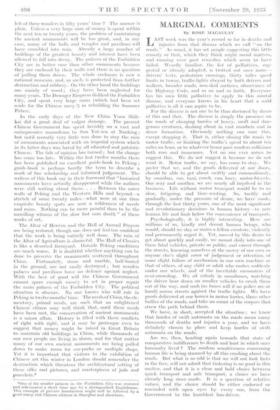MARGINAL COMMENTS
By ROSE MACAULAY
LAST week was the year's record so far in deaths and injuries from that disease which we call " on the roads." As usual, it • has set people suggesting this little remedy or that, which they think might mend matters,. and running over past remedies which seem to have failed. Wearily familiar, the list of palliatives, sug- gested or already adopted, is trotted out once more-s- drivers' tests, pedestrian crossings, thirty miles speed . limits in towns, traffic-lights obeyed by both drivers and .walkers, broader roads, non-skid surfaces, observance of the Highway Code, and so on and so forth. Everyone has his own little palliative to apply to this mortal disease, and everyone knows in his heart that a mild palliative is all it can aspire to be.
. For the disease is not one to be thus doctored by closes of this and that. The disease is simply the presence on the roads of charging hordes of heavy, swift and dan- gerous creatures, dashing about in vast numbers and in dense formation. Obviously nothing can cure this, except stopping it. That is, either closing the roads to motor traffic, or limiting the traffic's speed to about ten miles an hour, or to Whatever lesser pace renders collisions both rare and innocuous. Yet no one ever .seems to suggest this. We do not suggest it because we do not want it. Motor traffic, we say, has come to stay. We prefer that we, and the goods delivered at our doors, should be .able to get about swiftly and commodiously, by omnibus, car, taxi, coach, van, lorry, motor-bicycle. One nay and another, we arc nearly all involved in the business. Life without motor transport would be to us slow, fatiguing, and time-wasting. So, tacitly and gradually, under the pressure of desire, we ' have • made, through the last thirty years, one of the most significant and revolutionary decisions in human history—to. rate human life and limb below the convenience of •transport.
• Psychologically, it is highly interesting. ' Here are millions of us, kindly and decent human beings, who would, should We slay or maim a fellow-creature; violently and permanently regret it, Yet, moved. by this desire to get about quickly and easily, we mount daily into one of these fatal vehicles, privateur public, and career through the streets, knowing ourselves at the mercy of our own or anyone else's slight error of judgement or attention, of -some- slight- failure of mechanism in our own machine or that of others, of any child or adult who rushes suddenly under our wheels, and of the inevitable encounters of ' over-crowding. • We sit calmly in omnibuses, watching the driver bear down on smaller vehicles to crush i hem out of the way, and rush (as buses will no police are at 'hand) across streets against the traffic lights.- We have goods delivered at•our homes in motor lorries, those other -bullies of the roads, and take no count of the corpses that strew the path behind them, We have, in short, accepted the situation ; we know 4.hat hordes of swift 'automata on the roads mean many thousands of deaths and injuries a year, and we have definitely chosen to place and keep hordes of swift automata on the roads.
Are we, then, heading again towards that state of comparative indifference to death and hurt in which once -humanity lived ? The modern sensitiveness concerning human life is being stunned by all this crashing about the roads. But what is so odd is that we will not look facts in the face, will not admit that tinkering is no good in this matter, and that. it is a clear and bald choice between • quick transport and safe transport, a choice we have already long since made. It is a question of relative values, and the choice should .be either endorsed or rescinded with open eyes by every one, from the Government to the humblest bus-driver.












































 Previous page
Previous page